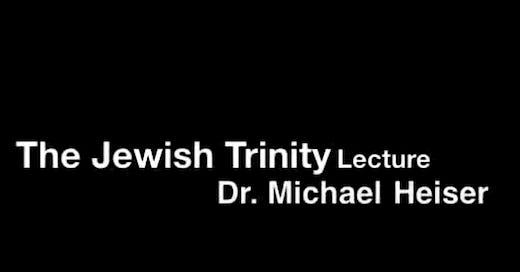The Jewish Trinity - Part One
How the Trinity in Christianity is Rooted in the Two Powers Theology of Ancient Judaism and Divine Pluralism of the Ancient Near Eastern Religions
The Trinity was not an invention of the Christian Fathers, but rather is discernible in the text of the Old and New Testaments. The concept of divine plurality goes far back into antiquity. It can be found even in Sumerian literature and the Hindu Vedas. In this multipart series, Dr. Heiser gets into the Jewish Two Powers theology and how it provides context to our orthodox Christian beliefs of the Godhead.1
Summary
2Dr. Michael Heiser discusses the concept of the Jewish Godhead as depicted in the Old Testament, challenging the assumption that the Old Testament cannot support the Christian doctrine of the Trinity. He argues that the term Elohim, commonly translated as "God," is used in the Hebrew Bible to describe multiple divine beings, including angels, demons, and the divine council. He highlights the importance of understanding the context in which these terms are used, emphasizing that the placement of a being in the spiritual realm determines whether they are considered an Elohim. Heiser contends that recognizing divine plurality within the Old Testament can facilitate Jewish evangelism and provide a foundation for understanding the transition from Jewish to Christian theology.
Insights
The challenge of reconciling divine plurality with monotheism in the Old Testament.
The difficulty in explaining Jesus as God to Jewish people while maintaining monotheism.
The issue of English translations obscuring the use of the term "Elohim" in the Old Testament.
The concern that traditional understanding of monotheism doesn't align with the Old Testament usage of "Elohim".
Is there more than one Elohim that is real or that exists?
Are you a monotheist if you believed in more than one Elohim?
Do you believe in a single unique Elohim in the entire spiritual world?
Outline
Understanding the Jewish Trinity: Introduction and Aims
Michael Heiser introduces the topic of the Old Testament and the Jewish Godhead, emphasizing the aim to explore this concept without reference to the New Testament.
Heiser outlines the benefits of understanding this concept, including Jewish evangelism, apologetics, theology, and continuity between the Testaments.
Heiser explains the challenge of divine plurality and its historical context in Judaism, noting that belief in two powers in heaven was normative until the end of the second century.
Heiser mentions various groups, such as Jehovah's Witnesses and Mormons, who present challenges to the Christian understanding of the Godhead, and how the Old Testament can be used to address these challenges.
Challenges from Jehovah's Witnesses and Mormons
Heiser discusses the beliefs of Jehovah's Witnesses, who deny that Jesus is a deity, and Mormons, who see many gods in their Bible.
Heiser criticizes the academic view that the New Testament authors invented the concept of the Trinity, arguing that it is consistent with the Old Testament.
Heiser emphasizes the importance of biblical continuity and interpretive clarity, suggesting that the Old Testament provides context for understanding the New Testament.
Heiser mentions the need to address weird passages and the importance of contextualized theology, which involves thinking like an ancient Israelite.
The Concept of Elohim and Monotheism
Heiser introduces the term Elohim, explaining its frequent use in the Old Testament and its various applications, including the God of Israel, gods of the nations, and demons.
Heiser presents a monotheism test, asking if there is more than one Elohim that exists, and discusses the tension between the use of the term Elohim and monotheism.
Heiser explains that Elohim refers to the spiritual world and is not tied to a specific set of attributes, which is why more than one thing can be called Elohim.
Heiser argues that the biblical writers did not attach a specific set of attributes to the word Elohim, and that understanding this can help Christians communicate with Jews about the concept of Jesus as God.
Divine Plurality and the Shema
Heiser discusses the concept of divine plurality and its relationship to the Shema, emphasizing that Yahweh is inherently superior and in command.
Heiser explains the sonship language used in the Old Testament, which applies to both Israel and the king, and how this language can be used to introduce the concept of Jesus as the Son of God to Jews.
Heiser references Psalm 82, explaining that the Elohim in this psalm are not the Trinity but divine beings who are judged by Yahweh.
Heiser argues that the Shema does not contradict divine plurality, as it is a statement of Yahweh's uniqueness and incomparability, not a denial of the existence of other elohim.
The Role of Yahweh and Other Divine Beings
Heiser explains that Yahweh is the supreme Elohim and that other divine beings are subject to him, emphasizing that this does not threaten monotheism.
Heiser discusses the concept of Yahweh as both invisible and visible, and how this is reflected in the Old Testament.
Heiser argues that the Old Testament provides categories for understanding the concept of two divine beings, which can help Jews understand the Christian concept of the Trinity.
Heiser criticizes scholars who present the New Testament as an invention of the early church, arguing that they are ignorant of the Old Testament context.
Conclusion and Teaser for Next Week
Heiser summarizes the key points discussed, including the importance of understanding divine plurality and the uniqueness of Yahweh.
Heiser teases the next week's topic, which will explore the concept of the two powers in heaven and how it relates to the Old Testament.
Heiser emphasizes the importance of contextualized theology and understanding the biblical writers' use of terms like Elohim.
Heiser concludes by encouraging participants to think like ancient Israelites and to use the Old Testament to address challenges to the Christian understanding of the Godhead.
This summary is provided with the help of Otter.ai.



